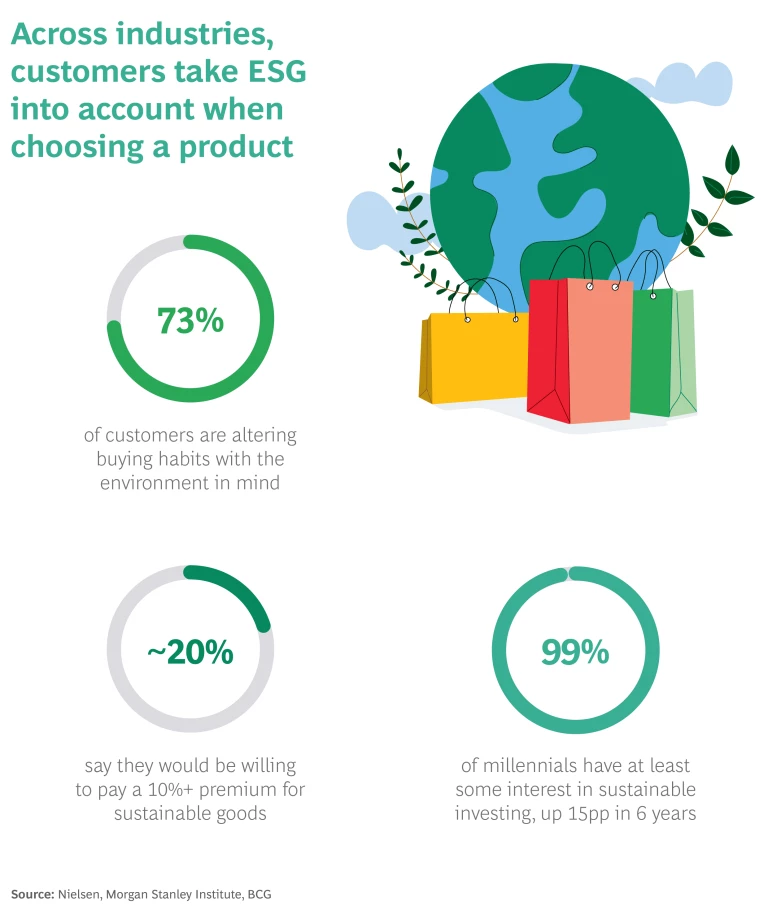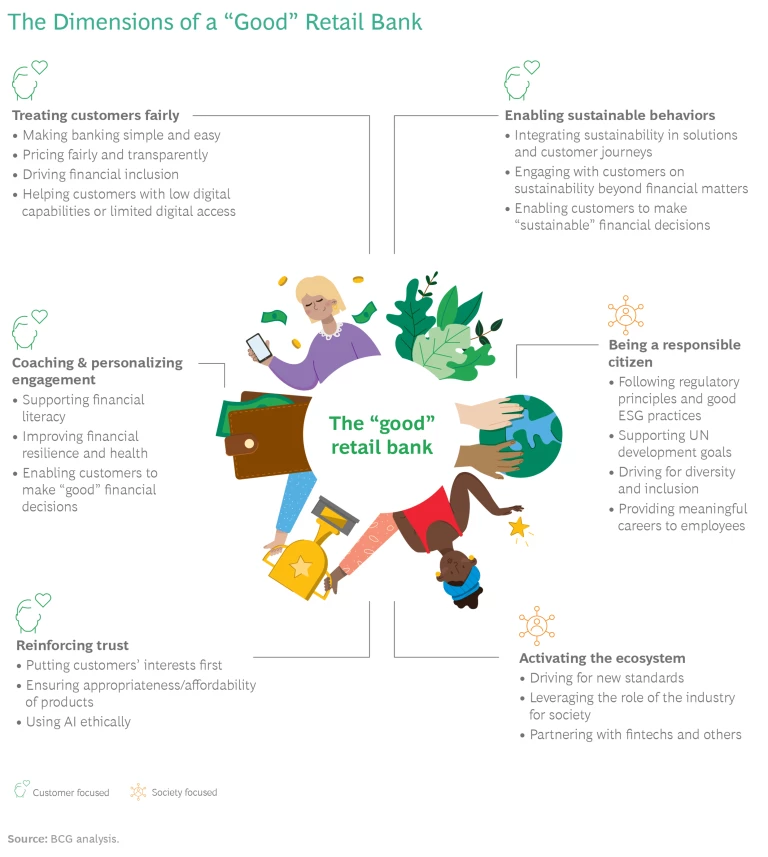Retail banks with their eye on the future should consider two critical questions. Over the next few years, what will your customers want beyond the standard financial products and services? And how can you align your business goals with meeting those needs—before competitors beat you to it?

Sustainability—a company’s capacity to make a positive environmental and societal impact—lies at the core of the first question. This concept is moving up the priority list for all retail bank stakeholders. It’s quickly becoming the next frontier of competitive advantage and a pillar of future growth. In response, leaders have developed aggressive environmental, social, and governance (ESG) goals and agendas. Those who have been slower to act will feel pressure, perhaps from multiple quarters, to follow suit.
This raises another important question: What does a “sustainable” bank look like? There’s likely no universal combination of factors. Environmental concerns are only one leg of the stool. Social and governance initiatives are receiving as much or more attention. In emerging markets, for example, many banks are focused on issues such as poverty and financial inclusion for those with limited or no access to financial services. Consumers and regulators in many Western markets are looking for demonstrable progress on diversity, equity, and inclusion (DEI) in areas such as hiring and lending. Privacy and data-security worries put social and governance issues high on board-level agendas.

Wherever the emphasis or industry, in today’s marketplace, engaging with customers and other stakeholders on ESG issues is becoming de rigueur. Fortunately, banks start from a sound position. They have strong relationships with their customers—who want their banks to feel like a “good friend” that they can turn to for honest advice and a “school” where they can obtain financial guidance. And while customer needs vary widely by market, there are plenty of opportunities for banks to provide high-impact services at very basic levels, such as enabling sustainable behaviors or providing financial coaching. BCG research shows that in every major market, banks are innovating solutions that cover most, if not all, customer value streams.
Going further, banks must look for places in new markets where they have unique advantages and can create offerings and build business models to leverage them. For example, banks have many opportunities to innovate sustainable practices and products along the customer lifecycle. The push to limit temperature increases will drive a massive transformation of the global economy, requiring enormous investment, including by consumers (think loans for renewable energy sources and electric vehicles) and small business customers, who will need to address a variety of emissions. Banks can also use the daily banking relationship as well as their personalized engagement capabilities to support customers in environmentally friendly and ethical living.
We expect that leading banks will also build platforms of offers that help consumers live more sustainably and encourage small businesses to adopt good ESG practices. This is one reason that leading retail banks are making ESG a primary focus area for their digital transformation initiatives. Banks have the potential to serve as green ecosystem orchestrators, bringing together clusters of providers that can meet customer needs in value streams such as reducing home and building or supply chain emissions. They can also provide a “one-stop green shop” that offers products and services that include a knowledge hub and tools, qualified and pre-screened vendors, cost estimations and simplified information request processes, financing support options, and more.
BCG’s recent analysis of evolving retail banking profit pools indicates that ESG-related products in core business lines could generate substantial revenue streams. It is difficult to predict how quickly this will occur, since growth will follow underlying market trends. But more important than a debate over speed is the fact that the share of bank ESG products will increase and eventually replace almost all non-ESG business. This presents a big opportunity. For example, a 20% ESG-related share in new retail banking revenues in the next five years would result in about a 10% share of total retail banking revenues—or about $300 billion by 2025. Retail banks that gain early share in these emerging product lines will be best positioned to achieve above-market growth in the coming years.
Subscribe to our Financial Institutions E-Alert.
Environmental and social challenges transcend generations—and set societies and their institutions, such as government and business, on new paths. Many banks may need to build new enablers, including green products and tools, budget and life planning tools, data and AI tools and policies, and fair pricing structures. Where they do not have internal capabilities, or these are too time-consuming or expensive to build, they may also need to pursue relevant partnerships.
We explore all these changes and their ramifications in our 2022 report on global retail banking.













